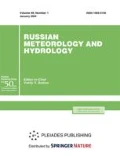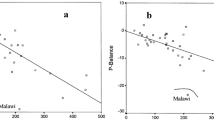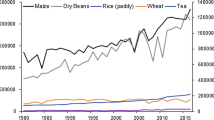Abstract
The concept of land use adaptation to climate change and a short history of its formation in Russia are described. The global problems and disadvantages of the adaptation policy are listed, the Russian approaches and developed methods of land use adaptation to climate change are specified. Although there are a lot of legislative acts and scientific recommendations in Russia, the tendency of developing only evaluation and monitoring activities is observed. Also, there is a lack of specific implemented agrotechnological projects aimed at the adaptation of agriculture to changing environmental conditions.
Similar content being viewed by others
REFERENCES
Climate Change Adaptation and Mitigation in Agriculture. World Development Report. Analytical Note: Agriculture for Development (The World Bank, 2008) [in Russian].
G. V. Blagoveshchenskii, V. D. Shtyrkhunov, and S. M. Timoshenko, “Adaptation of Grass Agroecosystems in European Changing Climate,” Kormoproizvodstvo, No. 4 (2018) [in Russian].
T. A. Boldanov and G. D. Mukhin, “Ecological Adaptation of Agricultural Land Use in a Changing Climate in the Republic of Buryatia,” Aridnye Ekosistemy, No. 1, 25 (2019) [in Russian].
Second Roshydromet Assessment Report on Climate Change and Its Consequences in the Russian Federation. General Summary (Roshydromet, Moscow, 2014) [in Russian].
A. V. Gordeev, A. D. Kleshchenko, B. A. Chernyakov, O. D. Sirotenko, S. O. Siptits, I. A. Romanenko, S. A. Bartalev, and I. Yu. Savin, Bioclimatic Potential of Russia, Productivity and Rational Placement of Agricultural Crops in a Changing Climate (Minsel’khoz, Moscow, 2012) [in Russian].
A. V. Gordeev, A. D. Kleshchenko, B. A. Chernyakov, O. D. Sirotenko, V. N. Temnikov, I. B. Uskov, V. A. Romanenkov, and D. I. Rukhovich, Bioclimatic Potential of Russia in a Changing Climate, Ed. by A. V. Gordeev (Minsel’khoz, Moscow, 2008) [in Russian].
V. M. Ivonin, “Substantiation of the System of Forest Meliorations of Natural and Anthropogenic Landscapes,” Nauchnyi Zhurnal Rossiiskogo NII Problem Melioratsii, No. 3 (2017) [in Russian].
V. M. Kattsov and B. N. Porfir’ev, “Assessment of Macroeconomic Effects of Climate Change in the Russian Federation for the Period till 2030 and Beyond (Report Summary),” Trudy GGO, No. 563 (2011) [in Russian].
V. M. Kononov and N. D. Kononova, “Adaptive Land-use Reserves,” Izv. Orenburgskogo Gosudarstvennogo Agrarnogo Un-ta, No. 2 (2008) [in Russian].
S. V. Levykin and G. V. Kazachkov, “Adaptive Husbandry as a Perspective for Developing Unclaimed Agricultural Lands in the Dry Steppe Subzone,” Agrarnaya Rossiya, No. 5 (2013) [in Russian].
On Participation of the Russian Federation in the Implementation of the United Nations Framework Convention on Climate Change (1994–2014) (Nepravitel’stvennyi Ekologicheskii Fond Imeni V. I. Vernadskogo, Moscow, 2014) [in Russian].
V. B. Pavlenko, “The Paris Agreement as a Threat to the National Security of Russia,” Astrakhanskii Vestnik Ekologicheskogo Obrazovaniya, No. 4 (2017) [in Russian].
V. N. Pavlova, “Agroclimatic Resources and Agricultural Productivity in Russia to Implement New Climatic Scenarios in the 21st Century,” Trudy GGO, No. 569 (2013) [in Russian].
V. N. Pavlova and S. E. Varcheva, “Estimating the Level of Territory Vulnerability and Climate-related Risk of Significant Grain Crop Failure in Grain-producing Regions of Russia,” Meteorol. Gidrol., No. 8 (2017) [Russ. Meteorol. Hydrol., No. 8, 42 (2017)].
V. N. Pavlova and A. A. Karachenkova, “Observed Climate Change and Dynamics of Agroclimatic Resources in the 20th–21st Centuries in the Volga Federal District,” Trudy GGO, No. 583 (2016) [in Russian].
The Seventh National Report of the Russian Federation Presented in Accordance to the Clauses 4 and 12 of the United Nations Framework Convention on Climate Change and the Clause 7 of the Kyoto Protocol (Roshydromet, Moscow, 2017) [in Russian].
O. D. Sirotenko and V. N. Pavlova, “Methods for Assessing Climate Change Impact for Physical and Biological Systems,” in Methods for Assessing Climate Change Impact on Agricultural Productivity, Ed. by S. M. Semenov (Roshydromet, Moscow, 2012) [in Russian].
V. V. Taran, N. D. Avarskii, and Zh. E. Sokolova, “A Role of Organic Agricultural Production in Solving Problems of Global Climate Change,” Ekonomika, Trud, Upravlenie v Sel’skom Khozyaistve, No. 1 (2018) [in Russian].
A. M. Tarko, “Modeling Global Biogeochemical Cycle of Carbon in the Biosphere and Global Warming,” in Proceedings of the 6th Conference “Mathematical Modeling in Ecology” (EkoMatMod-2019) (IFKhiBPP RAN, Pushchino, 2019) [in Russian].
FAO Strategy on Climate Change (Rome, 2018) [Transl. from English].
S. Akpan and J. U. Edet, “Farmers’ Decision to Participate in Government Agricultural Programs in a Volatile Political Environment: A Case Study of Famers in the South-South Region of Nigeria,” Russ. J. Agricul. Socio-Economic Sciences, No. 5 (2016).
R. A. Betts, P. M. Boorman, N. R. Kaye, M. P. Mc Carthy, D. J. Mc Neall, M. G. Sanderson, A. J. Wiltshire, N. W. Arnell, S. E. Cornell, and J. I. House, “Climate Change Impacts and Adaptation: An Earth System View,” in Understanding the Earth System: Global Change Science for Application (Cambridge University Press, 2009).
L. Bizikova, M. Nijnik, and A. Nijnik, “Exploring Institutional Changes in Agriculture to Inform Adaptation Planning to Climate Change in Transition Countries,” Mitigation and Adaptation Strategies for Global Change, No. 8, 20 (2015).
Core Writing Team, Climate Change 2014: Synthesis Report. Contribution of Working Groups I, II and III to the Fifth Assessment Report of the Intergovernmental Panel on Climate Change, Ed. by R. K. Pachauri and L. A. Meyer (IPCC, Geneva, 2014).
Ecosystem-based Approaches to Adaptation: Compilation of Information. United Nation Framework Convention on Climate Change, FCCC/SBSTA/2011/INF.8 16 November 2011. Subsidiary Body for Scientific and Technological Advice.
D. Ellison, H. Petersson, P. E. Wikberg, and M. Lundblad, “The Incentive Gap: LULUCF and the Kyoto Mechanism before and after Durban,” Global Change Biology Bioenergy, No. 6, 5 (2013).
P. M. Kelly and W. N. Adger, “Theory and Practice in Assessing Vulnerability to Climate Change and Facilitating Adaptation,” Climate Change, No. 4, 47 (2000).
G. Kust and O. Andreeva, “The Science of Making Land Adapted to Climate Change—An Attempted Assessment,” in Drylands, Deserts & Desertification, 5th International Conference, Israel, 2014.
C. R. Pyke and S. J. Andelman, “Land Use and Land Cover Tools for Climate Adaptation,” Climatic Change, No. 3–4, 80 (2007).
I. A. Romanenko, V. A. Romanenkov, L. K. Shevtsova, P. Smith, J. U. Smith, O. D. Sirotenko, N. V. Lisovoi, D. I. Rukhovich, and P. V. Koroleva, “Constructing Regional Scenarios for Sustainable Agriculture in European Russia and Ukraine for 2000 to 2070,” Regional Environmental Change, No. 2, 7 (2007).
D. Sietz and H. van Dijk, “Land-based Adaptation to Global Change: What Drives Soil and Water Conservation in Western Africa?”, Global Environmental Change, 33 (2015).
I. Weindl, H. Lotze-Campen, A. Popp, C. Müller, C. Schmitz, S. Rolinski, P. Havlik, and M. Herrero, “Livestock in a Changing Climate: Production System Transitions as an Adaptation Strategy for Agriculture,” Environ. Res. Lett., No. 9, 10 (2015).
Funding
The research was carried out under the theme of the Ministry of Science and Higher Education of the Russian Federation within the state assignment of the Institute of Geography of Russian Academy of Sciences 0148-2019-0009 “Climate Change and Its Consequences for the Environment and Population Life on the Territory of Russia.”
Author information
Authors and Affiliations
Corresponding author
Additional information
Russian Text ©The Author(s), 2020, published in Meteorologiya i Gidrologiya, 2020, No. 12, pp. 20-26.
About this article
Cite this article
Sukhoveeva, O.E. Adaptation of Land Use to Climate Change in Russia. Russ. Meteorol. Hydrol. 45, 830–834 (2020). https://doi.org/10.3103/S106837392012002X
Received:
Revised:
Accepted:
Published:
Issue Date:
DOI: https://doi.org/10.3103/S106837392012002X




